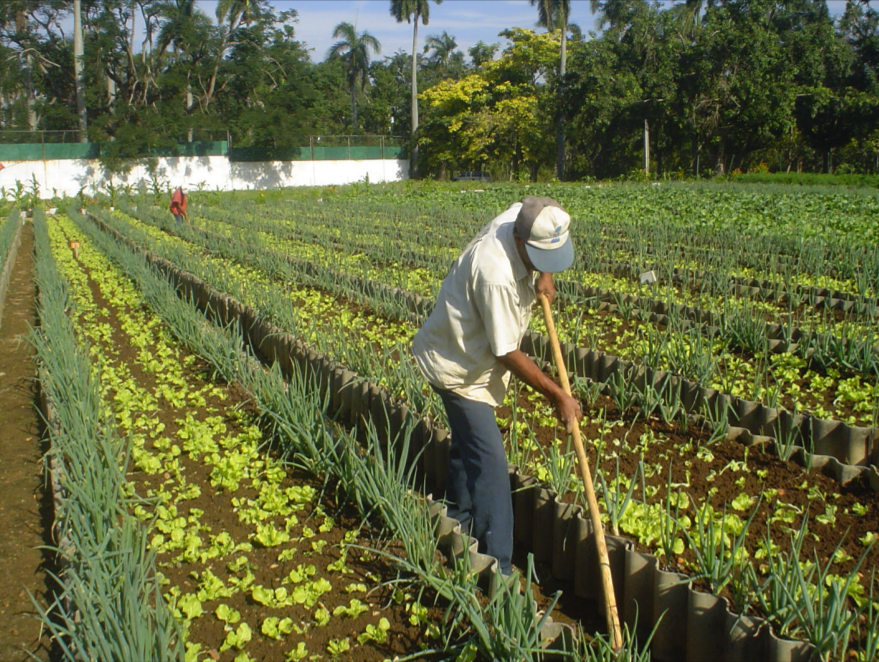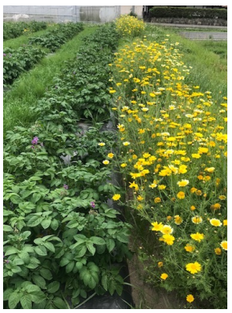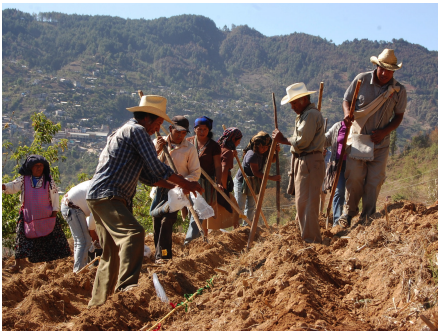|
written by Angela Saenz & Alireza Shokoohi Dr. Miguel Altieri is a Chilean agronomist and entomologist that has dedicated his life and career to agroecology. He is currently an emeritus professor from the University of California, Berkeley, where he teaches sustainable management practices to enhance biological control on farms. He is also a part-time farmer in the slopes of the Colombian Andes and the co-director of CELIA (Centro Latinoamericano de Investigaciones Agroecológicas), an organization focused on teaching, extension, and outreach for small farmers and research for food production through biodiverse systems. Dr. Altieri presented at the Entomology Departmental seminar recently and began his talk by discussing some of the changes in coffee production that have taken place due to increased pressure for greater yields of high-quality coffee. When coffee is produced as a polyculture in the understory of a shade canopy and soil coverage, we can see an increase in biodiversity and ecosystem services (Staver et al., 2001). However, intensification in the production of coffee requires a conversion to a monoculture with less shade, resulting in increased water loss through evaporation from leaves and surfaces as well as dramatic drops in biodiversity, causing an increase in pests and diseases. Modern industrial agriculture is highly dependent on outside resources to control the introduction and spread of pests and diseases, making it highly vulnerable to climatic changes and natural disasters. As shown in the past by outbreaks of Ebola, avian flu, and other zoonotic diseases, there is a very close link between human activities, health, and ecological disasters. As seen with COVID-19 and other animal-related diseases, the destruction of natural resources for monoculture expansion and the industrialization of animal production has drawn viruses and zoonotic diseases to spaces closely related to humans (Everard et al., 2020). The repercussions of the COVID-19 pandemic on our existing food production system have demonstrated the industrialized and globalized food supply system's social-ecological fragility. The social impact and implications of the pandemic on farmers, workers, members of supply chains, and consumers have been disastrous. Just as in the rest of the world, during the pandemic Maryland farmers were faced with resource shortages, the transportation and distribution of goods were limited; and even workers had to be quarantined, making the harvesting process and the shipment of products to stores and consumers more difficult. This was a clear example of the vulnerability that consumers face to access high-quality food, demonstrating that an industrialized food system has different repercussions at different socio-economic levels. In countries highly dependent on the export of ‘dessert products’, which are non-essential products that can fall out of demand in times of crisis, and in countries highly dependent on food imports, the economic and social implications of COVID-19 have been even harsher. Food pantries and communal orchards have become important factors in local food sovereignty and safety, demonstrating that agroecology plays an important role not only on a communal scale but on a local and regional scale. Agroecology refers to the application of ecology and sustainability-oriented practices to farming while empowering local people to adapt agricultural practices with distinct local environmental conditions in mind. It requires a deep understanding of a wide range of both science-based factors and traditional farmers’ knowledge. There are two main agroecological principles: 1) soil organic management, which leads to nutritionally balanced crops and healthier plants able to withstand diseases and pests better individually; and 2) crop diversification, for optimization of biological control, efficient use of resources, and complementarity between crops for higher crop yield. As farming practices are adapted for restoring ecological balance in agriculture, farms will exhibit greater resilience to cope with future challenges related to pest outbreaks, pandemics, and climate change. Farmer autonomy through agroecology decreases the need for external input of pest control, as replacing monocultures with more diverse ecosystems can lead to beneficial services provided by the landscape, just as shade-grown coffee, that has been reported to create a complex food web helping with the suppression of pest and with the conservation of wildlife (Staver et al., 2001). The efficacy of sustainable farming practices has already been shown in many cases around the globe. Dr. Altieri mentioned the case of urban agriculture in Cuba, where as a result of a U.S. embargo and the dissolution of the Soviet Union, a fuel crisis forced people in cities and their surroundings to procure food on their own. Urban gardens comprise 50% of all the vegetables and fruits produced on the island with more than a million tons of food produced by 2014 (Fernandez et al., 2018), as the speaker explains, each square meter of these urban farms can provide up to 20 kg of food per year, and the use of vegetable gardens has proven to satisfy up to 55% of the annual legumes needs of small families, exemplifying the importance and efficacy of local communal efforts towards food security. Agroecological principles have also been introduced domestically to farms in areas such as California, for instance, some farms use strips of flowering plants to attract and provide habitats for beneficial insects (Figure 2). Establishing populations of predatory insects that feed on common pests reduces the need for pesticides while increasing the yield and sustainability of the farm (Landis et al., 2000). Multi-cropping practices through flower strips or cover crops can also reduce wind erosion, decrease evapotranspiration in crops, prevent the establishment of noxious weeds, lead to soil enrichment, and even create ecological fire breaks to control disease and pest outbreaks. One of the best ways farmers can support each other is by sharing alternative technologies and practices. In Central America and Mexico, these are called “Campesino a Campesino” -roughly translated to “Peasant to Peasant”- movements and are gatherings of farmer families that share their best practices on a horizontal knowledge transfer (Figure 3), building up trust and a sense of belonging. These movements can reach consumers through online or physical local markets, constructing a pathway that bypasses industrialized food producers. One of the main organizations in the world involved in this movement is La Via Campesina. When a link between small farmers and communities composed of vulnerable populations is developed, solidarity networks can start to form. In these, a resource or work exchange can happen to benefit both sides, creating an adaptation to a short value chain with a flexible framework for food sale and access, making these markets less vulnerable to price changes, benefiting the producers, the intermediaries, and the consumers. Understanding that eating is both an ecological and political act, Dr. Altieri pointed out consumers' critical role in creating socio-ecological sustainability and resilience.
The COVID-19 pandemic has made clear now more than ever the importance of diverse and sustainable agricultural practices. Despite overwhelming reluctance and market pressure preventing the adoption of these practices; there are numerous examples of the benefits of incorporating agroecological concepts into modern farming, including but not limited to enhanced resilience in the face of crises such as the one we have been dealing with for almost two years. Dr. Altieri clarified that these changes need to start at the level of farmers, not corporations. He also urges scientists, given their privileged position as educated people with a powerful platform and access to resources, as well as urban dwellers, who make up for a large portion of the American population despite their distance from agriculture, to understand the issues currently plaguing the agricultural industry and push for societal change. References: Everard, M., Johnston, P., Santillo, D., and Staddon, C., 2020. The role of ecosystems in mitigation and management of Covid-19 and other zoonoses. Environmental science & policy, 111, pp.7-17. Fernandez, M., Williams, J., Figueroa, G., Graddy Lovelace, G., Machado, M., Vasquez, L., Perez, N., Casimiro, L., Romero, G. and Funes Aguilar, F., 2018. New opportunities, new challenges: Harnessing Cuba’s advances in agroecology and sustainable agriculture in the context of changing relations with the United States. Elem. Sci. Anth. 6(1): 76. doi:10.1525/elementa.337 Landis, D.A., Wratten, S.D., and Gurr, G.M. 2000. Habitat management to conserve natural enemies of arthropod pests in agriculture. Annual review of entomology, 45(1): 175-201. doi:10.1146/annurev.ento.45.1.175 Nicholls, C.I. & M.A. Altieri. 2018. Caminos para la Amplificación de la Agroecología. Boletín Científico 1. CELIA Ediciones. Medellín, Colombia. http://celia.agroeco.org/wp-content/uploads/2019/02/Boletin-Cientifico-CELIA-1.pdf (Consulted Oct 12th, 2021). Nicholls, C.I. & M.A. Altieri. 2019. Agroecología Urbana: Diseño de Granjas Urbanas Biodiversas, Productivas y Resilientes. Boletín Científico 2. CELIA Ediciones. Medellín, Colombia. http://celia.agroeco.org/wp-content/uploads/2019/03/Boletin-CELIA-2.pdf (Consulted Oct 12th, 2021). Nicholls, C.I. & M.A. Altieri. 2020. Estimando el “estado” agroecológico de una finca: una herramienta de evaluación rápida. Boletín Científico 4. CELIA Ediciones. Medellín, Colombia. http://celia.agroeco.org/wp-content/uploads/2020/11/Boletin4.pdf (Consulted Oct 12th, 2021). Staver, C., Guharay, F., Monterroso, D., and Muschler, R.G. 2001. Designing pest-suppressive multistrata perennial crop systems: shade-grown coffee in Central America. Agroforestry Systems, 53(2):151-170. doi:10.1023/A:1013372403359 Student’s bio: Angela Saenz is a first-year Master’s student in the Gruner Lab studying the spatial and temporal distribution of natural enemies of the Emerald Ash Borer in Maryland. Alireza Shokoohi is a Master’s student in the Lamp lab currently researching carabid beetle ecology within agricultural ditch ecosystems. Comments are closed.
|
Categories
All
Archives
June 2024
|
Department of Entomology
University of Maryland
4112 Plant Sciences Building
College Park, MD 20742-4454
USA
Telephone: 301.405.3911
Fax: 301.314.9290
University of Maryland
4112 Plant Sciences Building
College Park, MD 20742-4454
USA
Telephone: 301.405.3911
Fax: 301.314.9290




 RSS Feed
RSS Feed




